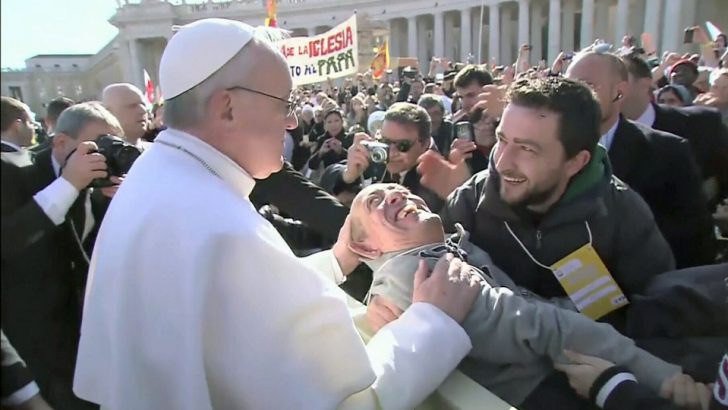One of the great challenges that Pope Francis is setting before the Church is the need for Catholics to get out of their comfort zones and bring the Gospel closer to people. Francis likes to talk about the absolute urgent need to reach out to what he describes as the “existential margins” or “peripheries” of our modern world.
(Of course, there’s a bit of a paradox because – at least in the western world – the Church itself increasingly finds itself on the existential margins in an increasingly secular environment, but that’s another discussion.)
The Pope’s point is that the Church will not be renewed by Catholics sitting around together in churches wondering why those who don’t come to Mass stay away. If we want to reach out to people, it means going beyond the church gates and being present in the places where people go.
It also means that community has to be the starting point of any authentic renewal of the Church. Often we start at the wrong place, we start at inviting people to come to Mass without realising that without a community to support us, faith can often falter. This is why so many young people give up the practise of their faith when they go to college unless they are involved in a vibrant chaplaincy or parish where they meet like-minded people.
Faith
We often speak of the Faith as being characterised by truth, beauty and goodness. Those who are attracted to the Christian life by a experience of truth and beauty are few and far between. More often than not, it is the goodness and witness of those who call themselves Christian that attracts people (which is a daunting responsibility).
Community was very much the focus at the ‘Picnic in Punchestown’ organised at the weekend by Kildare and Leighlin diocese (see pages 10-11). More than 4,000 people came together to celebrate at the venue better known as a racecourse. It was an extraordinary initiative and Bishop Denis Nulty and his team deserve huge praise for having the courage to try something new.
There was no ‘hard sell’ at Punchestown. The agenda was simple: to bring people together in the context of next year’s World Meeting of Families in Dublin.
It would be great to see more initiatives like this. The Church is fundamentally a community of believers coming together to worship God and to work to make the world a better place. But, before the worship and outreach can happen, a community has to be built and nurtured.
***
Lobbying the Pope
Recently declassified files released by the Public Records Office of Northern Ireland (PRONI) have revealed that the British government lobbied following the death of Cardinal Tomás Ó Fiaich to have a successor who might be seen as less critical of British policy in the North. The late cardinal had been a trenchant critic of Britain’s human rights abuses in the region. London, evidently, wanted someone who they felt would be a bit more passive.
In the end, Pope John Paul II chose then Bishop of Down and Connor Cahal Daly as the Primate of All-Ireland. It would be foolish, however, to think that even though Dr Daly would’ve been seen as more sympathetic to the British position, the Vatican was heavily influenced.
Rome has been appointing bishops for the best part of 2,000 years. The Pope has also been exchanging ambassadors with secular powers for some 1,700 years.
It won’t be the first time that the Holy See will have been lobbied about the appointment of a bishop, and Rome is well-versed in handling such lobbying.
Voices
One can also be sure that the British were not alone in their lobbying. I have no doubt that authorities in the Department of Foreign Affairs in Dublin were also keen to make their voices heard in Rome about the appointment of the country’s most-senior Churchman.
Of course, the fact that the British archives are now released a decade ahead of records in Dublin means that we’re always left guessing at what was going on in the minds of the Irish authorities.
This will become increasingly problematic as the history of the peace process continues to be written.
It will be a shame indeed if the story is one that is told in a one-sided fashion because the Dublin archives are released later.
***
Notorious veto
When it comes to secular influence in the appointment of bishops, there is no more egregious example than the notorious veto that used to be part of the process of electing a new Pope.
As recently as the conclave of 1903, the cardinals were in the process of electing Mariano Rampolla when the Emperor of Austria used his traditional prerogative to block the election.
Giuseppe Sarto was instead elected as Pope Pius X. The following year, the new Pope moved to abolish the veto once and for all and remove secular influence from the process of electing a Pope.


 Michael Kelly
Michael Kelly Pope Francis greeting the crowd during a General Audience.
Pope Francis greeting the crowd during a General Audience. 